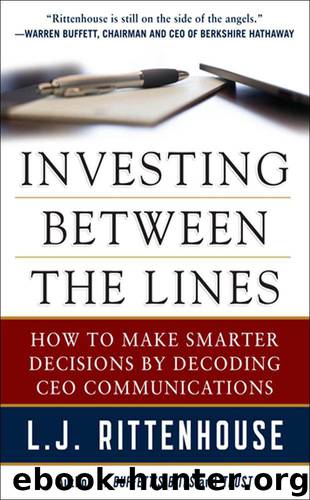Investing Between the Lines: How to Make Smarter Decisions By Decoding CEO Communications by L.J. Rittenhouse

Author:L.J. Rittenhouse [Rittenhouse, L.J.]
Language: eng
Format: mobi
Publisher: McGraw-Hill
Published: 2012-12-17T14:00:00+00:00
* Number of U.S. retirees and surviving spouses who received pension plan benefits
** Estimated number of U.S. employees, dependents, retirees, and surviving spouses covered by health benefits
Wagoner offered a stark statistic: “for every active GM employee in the United States last year, GM supported 3.2 retirees and surviving spouses. Back in 1962, the employee/retiree ratio was reverse:
GM had 11.5 active employees for every retiree or surviving spouse in our pension plans … GM’s health-care bill in 2005—for every U.S. employee, dependent, retiree, and surviving spouse—totaled $5.3 billion.”
He wrote that “no other company in the world has that kind of health-care obligation.” Furthermore, the governments of GM’s foreign-owned competitors covered “much of their employee and retiree health-care and pension costs.”
A 2005 industry report confirmed Wagoner’s analysis, estimating that the healthcare cost per GM vehicle was $1,525, while the health-care cost per Toyota vehicle made in the United States was $201.2 This disparity was reflected in the 2005 sales results: “GM’s U.S. sales were down 4.3 percent while Toyota’s sales were up 10.1. Because of its legacy costs, GM lost $2,331 on every vehicle it made while Toyota earned a profit of $1,488. GM’s plants were running at 85 percent capacity, while Toyota’s were running at 107 percent.3
Wagoner’s exemplary reporting on this competitive disadvantage, however, was weakened by FOG. For instance, he described GM’s “significant progress” in developing a commercial fuel-cell vehicle that promised to reduce carbon emissions and improve fuel economy. But there was no tangible evidence presented of what constituted this “significant progress.”
Wagoner wrote that the company’s turnaround in “the tough European market was on track” and described how “GM Europe cut its losses significantly based on good consumer acceptance of our new vehicles and strong progress on [its] cost-restructuring initiatives.” But he never disclosed how costs were being restructured and whether those changes could be sustained. Without supporting information, it was difficult to share his confidence about company progress.
More cracks surfaced in GM’s rocky foundation when accounting errors were discovered in the company’s prior financial statements. On March 16, 2006, GM announced it would delay filing its annual report.4 According to the Wall Street Journal, issues had been raised about the company’s classification of cash flow. In addition, GM’s net income from 2000 to 2004 would be restated and lowered due to “erroneous” reporting of past transactions.
Wagoner reassured readers when his 2005 letter was finally released in midyear that the company was “moving aggressively to strengthen [its] internal accounting resources.” He apologized for these errors on behalf of GM’s management team and wrote that management was working diligently to fix them. However, he never described what needed to be fixed or explained if this would require a material adjustment to the company’s financial results.
In other words, Wagoner educated readers about the company’s problems but did not consistently provide the context needed to build confidence in his reporting.
CLUE 2: OFFER MEANINGFUL CONTEXT
The word context is defined by Merriam-Webster as “the parts of a discourse that surround a word or passage and can throw light on its meaning.
Download
This site does not store any files on its server. We only index and link to content provided by other sites. Please contact the content providers to delete copyright contents if any and email us, we'll remove relevant links or contents immediately.
Hit Refresh by Satya Nadella(9133)
The Compound Effect by Darren Hardy(8966)
Change Your Questions, Change Your Life by Marilee Adams(7781)
Nudge - Improving Decisions about Health, Wealth, and Happiness by Thaler Sunstein(7706)
The Black Swan by Nassim Nicholas Taleb(7129)
Deep Work by Cal Newport(7083)
Rich Dad Poor Dad by Robert T. Kiyosaki(6632)
Daring Greatly by Brene Brown(6513)
Principles: Life and Work by Ray Dalio(6447)
Playing to Win_ How Strategy Really Works by A.G. Lafley & Roger L. Martin(6304)
Man-made Catastrophes and Risk Information Concealment by Dmitry Chernov & Didier Sornette(6019)
Big Magic: Creative Living Beyond Fear by Elizabeth Gilbert(5771)
Digital Minimalism by Cal Newport;(5764)
The Myth of the Strong Leader by Archie Brown(5507)
The Slight Edge by Jeff Olson(5417)
Discipline Equals Freedom by Jocko Willink(5389)
The Motivation Myth by Jeff Haden(5212)
The Laws of Human Nature by Robert Greene(5208)
Stone's Rules by Roger Stone(5088)
